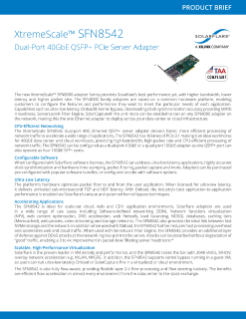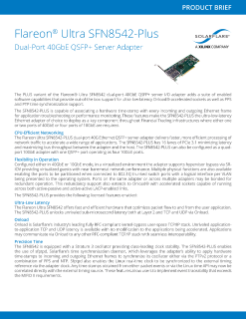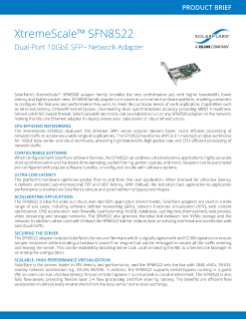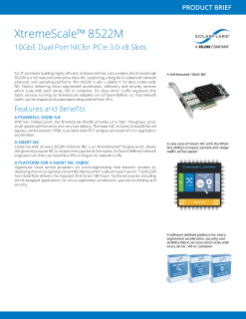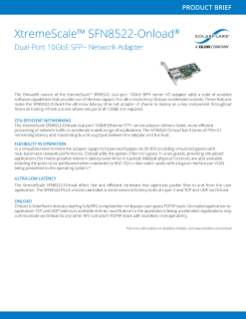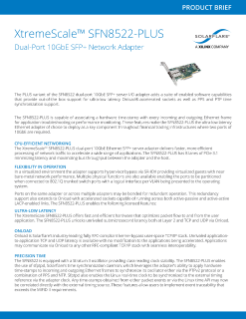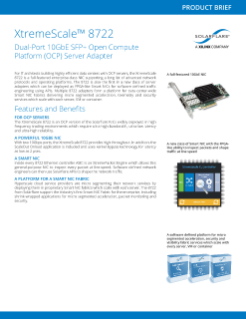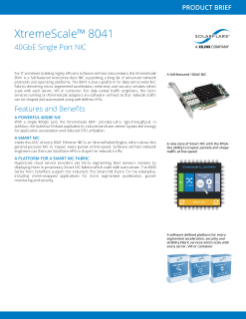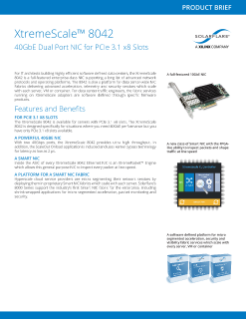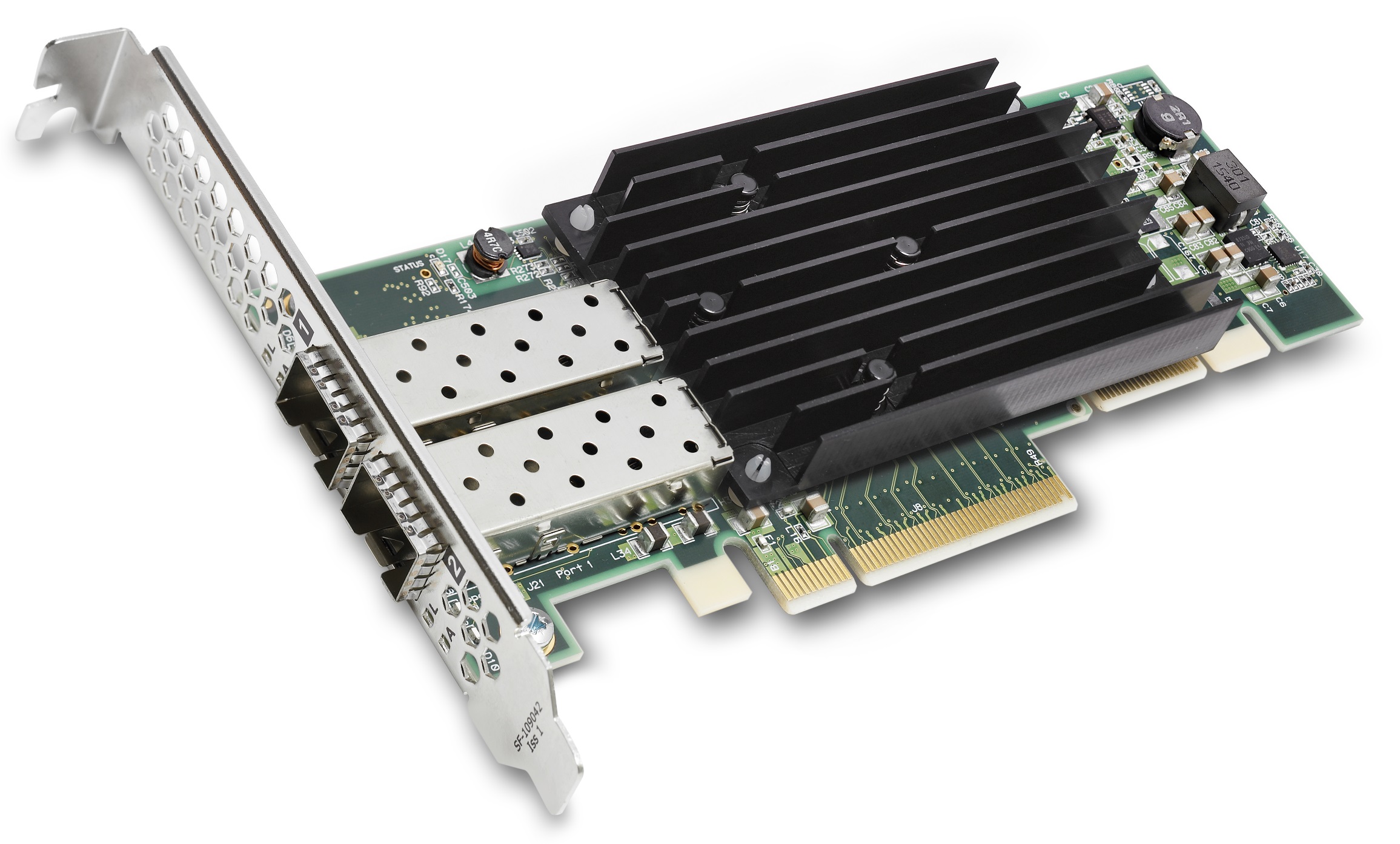
8000 Series Ethernet Adapters - 10/40GbE Network Adapters
AMD now offers the XtremeScale series of network interface controllers through our acquisition of Solarflare.
Product Description
In ultra-scale environments, we can’t be content with network adapters that simply connect servers to networks. Server level security, virtual machine (VM) level network telemetry, and application acceleration are issues that network adapters need to address at scale. Look to our XtremeScale 8000 series adapters to address your data center needs with market-leading features such as:
- Bandwidth up to 40Gbps
- Latencies below 1μsec
- XtremePacket Engine provides 1000s of flows/virtual NICs per adapter
- APIs to software defined the adapter enabling a wide range of capabilities
- UKB enables extreme application acceleration
- Telemetry for packet capture, monitoring and analysis
- NIC-level security through packet filtering and secure server lockdown
8000 Series 10/40GbE Network Adapters
 SFN8542 SFN8542 |
 SFN8542-PLUS |
 SFN8522 |
 SFN8522M |
 SFN8522-ONLOAD |
 SFN8522PLUS |
 SFN8722 SFN8722 |
| Product Brief | Product Brief | Product Brief | Product Brief | Product Brief | Product Brief | Product Brief |
| 40GbE | 40GbE | 10GbE | 10GbE | 10GbE | 10GbE | 10GbE |
| Dual Port | Dual Port | Dual Port | Dual Port | Dual Port | Dual Port | Dual Port |
| Low Profile, MD2 | Low Profile, MD2 | Low Profile, MD2 | Low Profile, MD2 | Low Profile, MD2 | Low Profile, MD2 | OCP v2.0 |
| PCIe 3.1 x16 | PCIe 3.1 x16 | PCIe 3.1 x8 | PCIe 3.1 x8 | PCIe 3.1 x8 | PCIe 3.1 x8 | PCIe 3.1 x8 |
| QSFP+ | QSFP+ | SFP+ | SFP+ | SFP+ | SFP+ | SFP+ |
| Includes Onload and TCPDirect Acceleration, PTP Synchronization | Includes Onload and TCPDirect Acceleration, PTP Synchronization | Includes Onload and TCPDirect Acceleration, PTP Synchronization | ||||
| MCTP over SMBus | ||||||
Featured Accessories
Onload™ - Application Acceleration Software
Onload™ dramatically accelerates and scales network-intensive applications such as in-memory databases, software load balancers, and web servers. With Onload, data centers can support 400% or more users on their cloud network while delivering improved reliability, enhanced quality of service (QoS) and higher return on investment, without modification to existing applications.
Onload allows data centers to realize:
- Improved elasticity and efficiency, leading to a lower total cost of ownership (TCO)
- Increased peak transaction rates, eliminating service brownouts
- Reduced network jitter with greater response times, equating to superior quality of service
Features:
- Add 400% or more users
- Improve messagerates by 100%
- Minimize server footprint 25%
- Reduce Latency by 50%
- Experience near zero jitter
- Maxmize capex & opex
- Enhance quality of service
Extending Data Center Investments
Onload delivers a return on capex investments by allowing data centers to redeploy 25% or more of their load-balancing servers for other tasks. Alternatively, data centers can attain a reduction in operational expenses (opex) by shrinking the overall server footprint.
How Fast Can Your Applications Go?
Onload accelerates nearly all network-intensive TCP-based applications. Typical performance improvements when utilizing Onload include:
| Use Case | Applicaation(s) | Performance Increase | Benchmark Documents |
|---|---|---|---|
| In-Memory Databases | Couchbase, Memcached, Redis | 100% | |
| Software Load Balancers | NGINX Plus, HAProxy | 400% | |
| Web Servers/ Applications | NGINX Plus, Netty.io | 50% |
AMD has produced a series of cookbooks that outline the servers we used, the configuration done, and exactly what testing was completed. The purpose of these cookbooks is to enable customers to reproduce the results obtained, as sometimes they can appear somewhat remarkable.
To obtain a copy, contact us.
Ensuring Uptime and Network Compatibility
Onload is built from the same I/O software technology that powers nearly every financial market and high-frequency trading application on the planet. POSIX compliant, Onload ensures compatibility with TCP-based applications, management tools, and network infrastructures. In addition, Onload provides RDMA-like performance without requiring a forklift upgrade to the data center’s network infrastructure and can be deployed across x86-based platforms running Linux – bare metal, virtual machine or container.
Enterprise Service and Support (ESS) from AMD delivers enterprise-class support services, including service level agreements (SLAs) suitable for deployment in Fortune 1000 data centers as well as high-frequency trading, cloud service providers and HPC environments.
ESS provides flexible service levels for a broad range of customers, from small to multi-national corporations with mission-critical applications. Customers who need to comply with Sarbanes-Oxley or similar inter-national regulatory and legal requirements, that require 24x7 support, should choose the Premium level.
ESS levels address a broad range of customers, from small sites to multi-national corporations with mission critical applications. Customers who need to comply with Sarbanes-Oxley or similar international regulatory and legal requirements should choose the Premium level.
| Level Benefits | Basic | Standard | Premium |
|---|---|---|---|
| Bug fixes | Yes |
Yes |
Yes |
| Maintenance releases | Yes |
Yes |
Yes |
| Support Delivery | Email and Phone | Email and Phone | |
| Contractual SLAs | Yes | Yes | Yes |
| Response Time Coverage | UK Business Hours 08:00 – 17:00 UK Time |
24x7 |
|
| Consulting Services |
Yes, additional charges applicable | Limited time included per agreement | |
* The Premium ESS subscription must cover all server adapters purchased by the company and there is a minimum purchase requirement of 100. For more information on Basic, Standard and Premium levels of support, please contact AMD Sales.
Telemetry is the Art Behind Capturing Network Packet Data
In this context telemetry is remotely collecting data on a given network packet. That data can be where a given packet was at a specific point in time along with the abstracted metadata that represents the network flow the data belongs to. Knowing everything about your network data can enable you to tune application performance while also securing your network. AMD provides several different methods for capturing network packet telemetry directly from the card itself or through a performance SolarCapture Pro driver.
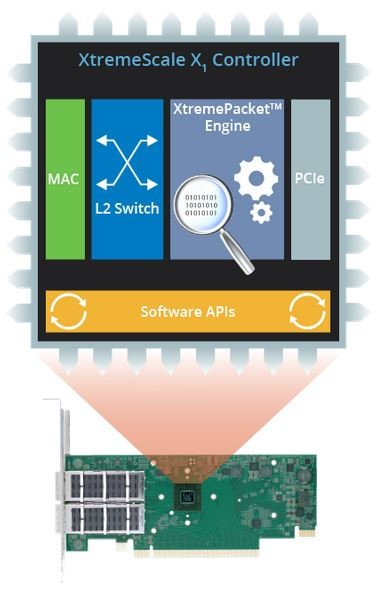
XtremePacket Engine
Rules based action on incoming and outgoing packets can be time stamped, counted, cloned, dropped, filtered and translated
L2 Switch
Incoming and outgoing packets can switched and Intelligently steered to a collection of cores on the host
SolarCapture Pro Libpcap Driver
SolarCapture Pro (SCP) from AMD is a kernel bypass performance tuned replacement for Libpcap. It is designed to provide a high rate of packet capture to memory, in the 10s of millions of packets per second. SCP supports three operating modes: sniff, steal or both. In sniff mode packets are delivered normally to applications or the network, but a clone of each packet, both transmitted and received packets, is sent to SCP for processing. In steal mode SCP receives all the packets coming into an interface. Finally, both modes can be engaged so that two parallel applications can analyze the same packet streams. To facilitate this SCP has a feature called clustering, which enables the creation of clusters of cores that can then be attached to capture instances for processing. SCP supports Berkeley Packet Filter (BPF) which can be applied to capture so that SCP only receives the packets requested while all others follow their normal path.
